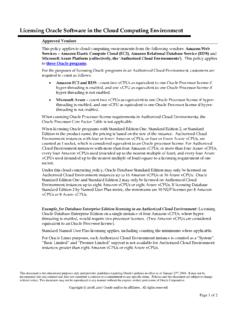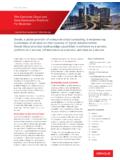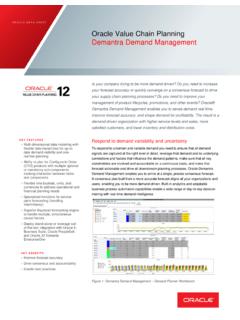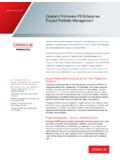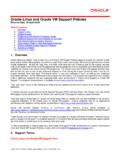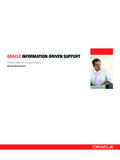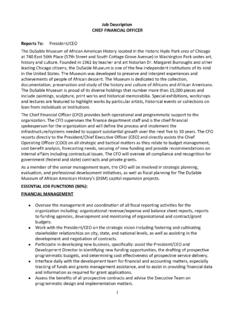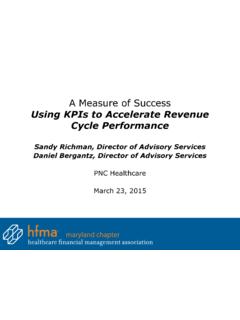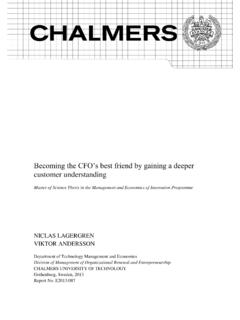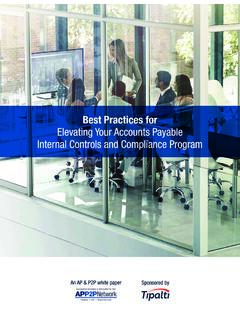Transcription of Mastering Big Data - Oracle
1 Mastering Big data :CFO Strategies to Transform Insight into OpportunityA FSN & Oracle White Paper Mastering Big data - A FSN & Oracle White Paper 2 Introduction 3 What exactly is Big data ? 4 Where is the value in Big data ? 4 The role of the CFO in Big data 7 The technical barriers to Big data success 7 CFO strategies for Big data success 8 Summary 9 Contents Mastering Big data - A FSN & Oracle White Paper 3 IntroductionSo profound is the potential impact of Big data that the World Economic Forum considers it to be a new class of economic asset1, akin to human capital and natural resources such as oil and gold.
2 And like the Klondike gold rush that preceded it, Big data has the capacity to transform the wealth and competitiveness of sovereign states, companies and individuals. So it is not surprising that Big data has become top of mind among C-levels worldwide; according to a 2012 McKinsey Global Survey of executives, over a third believe that Big data along with mobile, social, and cloud computing - will boost operating profits by 10 percent in just three organizations today are well positioned to take advantage of the profit opportunities afforded by Big data .
3 Through 2015, more than 85% of Fortune 500 organizations will fail to effectively exploit Big data for competitive Most organizations are being held back by fractured information systems, poor data management, insufficient database and hardware performance, as well as limited access to cutting-edge data discovery and visualization , whoever masters the art and science of big data will be poised to master their industries or markets. That s why smart CFOs are taking control of big data and business analytics projects, not just to uncover new ways to drive growth in a slowing global economy, but also to broaden their influence and impact on the enterprise.
4 Already increasingly responsible for overseeing IT investments and providing strategic insight to the board, CFOs will be increasingly called upon to take a crucial leadership role in assessing the value of Big data initiatives, building on their traditional skills analyzing and reporting on data to drive decision making. The most recent Gartner study on CFOs and technology reflects this new mandate, with business intelligence and business analytics investments ranking first among CFO investment priorities in white paper will examine why Big data is becoming increasingly important to CFOs and finance organizations, from its impact on specific industries and even governments, to the technical barriers that CFOs face in capitalizing on the promise of big data .
5 It will also examine the strategies and solutions CFOs can put into place to overcome these obstacles and ensure that investments in big data projects meet management expectations and deliver real value to the entire data : What s All the Fuss About? Every two days, we create as much information as we did from the dawn of civilization up until 2003. - Eric Schmidt, Executive Chairman, GoogleThe notion of Big data is not entirely new. After all, CFOs are accustomed to dealing with mounting volumes of information.
6 So why all the fuss? The volumes in most core financial applications are large but certainly not in the realms of the terabytes, petabytes, and even zettabytes being generated by the billions of connected devices consumers, companies, and governments use daily around the world. Big data takes large to an entirely new level, not just in the amount of information available, but in the economic opportunities that data can generate. But there are other reasons that make the issues of Big data different and urgent. First, the gap between the opportunities afforded by Big data and an organization s capability to exploit it is widening by the second.
7 For example, data is expected to grow globally by 40 percent per year but growth in IT spending is languishing at just 5 percent5. Second, businesses are being ravaged simultaneously by the twin challenges of rampant economic, regulatory and market change and unprecedented volatility - all happening at near Twitter-speed . As a result, there is intense interest in technologies and techniques that can provide an edge and shine a light on market trends quickly ahead of competitors. Third, stirred by Big data successes reported in the retail, healthcare and financial services sectors, amongst others, some market observers consider we are at the point of inflection, that Big data really is the catalyst for entirely new growth opportunities, products and services in the private sector, not to mention cost savings and more effective resource allocation for government organizations.
8 Mastering Big data - A FSN & Oracle White Paper 4 Big data is typically characterized by the so-called, three Vs : volume, velocity and variety. And when it comes to volume, the statistics bandied around by Big data cognoscenti are truly example, 15 out of 17 industry sectors in the United States will have more data stored per company than the Library of Congress, which itself collected 235 terabytes of data in April Wal-Mart Stores Inc.
9 Handles more than 1 million customer transactions every hour, feeding databases estimated at more than petabytes, or the equivalent of 167 times the books in the Library of Congress6. Thirty billion pieces of content are shared on Facebook, monthly5. Finally, Intel estimates that there will be 15 billion devices connected to the internet by 2015. Ironically, in many parts of the world, more people have access to a mobile device than to a toilet or running water7. But what is driving the explosive growth in data volume when the world s economy is hardly growing at all?
10 The explanation lies not in an increase in transaction volumes but a broadening of data sets, Variety (collecting more analysis about current data ) plus the collection of entirely novel types of data . For example, in the accounting arena Solvency II requires insurers to hold information about counterparties and IFRS demands more segmental analysis. Furthermore, environmental and sustainability reporting has forced some organizations to collect entirely new information, such as electricity meter readings and CO2 emissions. Hence organizations are grappling with variety as well as volume.
